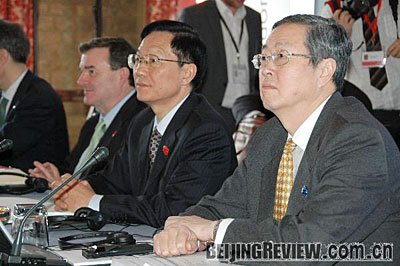|
 |
|
Chinese Finance Minister Xie Xuren (2nd R) and Zhou Xiaochuan (R), governor of the People's Bank of China, China's central bank, attend the opening ceremony of the G20 Finance Ministers' meeting at a hotel near Horsham in southern England, March 14, 2009. (Xinhua) |
The G20 Finance Ministers and Central Bank Governors meeting formally closed amid "quarrels" and "bargaining" in Horsham, Britain on March 14. At the strategic level, however, the divergence among member states over restoring the world economy remains huge.
Origins of EU-U.S. divergence
The United States advocates a bigger economic stimulus plan while the EU stresses reforms to strengthen the global financial system and better market supervision.
U.S. Treasury Secretary Tim Geithner has urged other G20 countries to boost their spending further, echoing the International Monetary Fund's (IMF) earlier recommendation that nations increase fiscal stimulus by at least 2 percent of gross domestic product to boost growth. But this caused much dissent among EU nations, most of which passed stimulus packages substantially smaller than the U.S. one. German Chancellor Angela Merkel and French President Nicolas Sarkozy are opposed to any more public spending as a means to stimulate the economy. Both of them believe what they've done is enough; regulation and market supervision should be given top priority to ensure a crisis like this will never happen again. British Prime Minister Gordon Brown, who hosted the meeting, took a middle course. Meanwhile, the BRIC countries--Brazil, Russia, India and China--demanded more say in international financial system reform.
Professor Huang Weiping from the Renmin University's School of Economics told Beijing Review that the divergence among G20 member states stems from the different situations they face and the different responsibilities they take in the crisis.
"The U.S. as the 'crisis maker' benefited the most from the old financial system, so it is reluctant to accept significant changes to the system. Germany enjoys a relatively better situation and hopes to focus more on financial regulation and market supervision," Huang said. "The UK takes a middle way--it doesn't want to see the U.S. remain at the core of the global financial system, but at the same time, its hands are tied by the deteriorating economic situation in the domestic sphere. The global financial system will inevitably change after the crisis."
Sun Jie, senior fellow at the Institute of World Economics and Politics at the Chinese Academy of Social Sciences, said that the current financial crisis has its roots in the U.S. sub-prime mortgage crisis and the subsequent credit crunch; the impact has been unfortunately expanded due to the lack of effective financial supervision in the United States.
"To some extent, the current economic slowdown in Europe was a consequence of the U.S. financial crisis, even though the euro zone had tighter regulations," Sun said. "It is reasonable for Europe to require financial supervision, as it sees itself becoming embroiled in the crisis. What's more, Europe is willing to promote international financial system reform with an aim to increase the role of the euro in the international monetary system and finally help realize diversification of the system.
|
